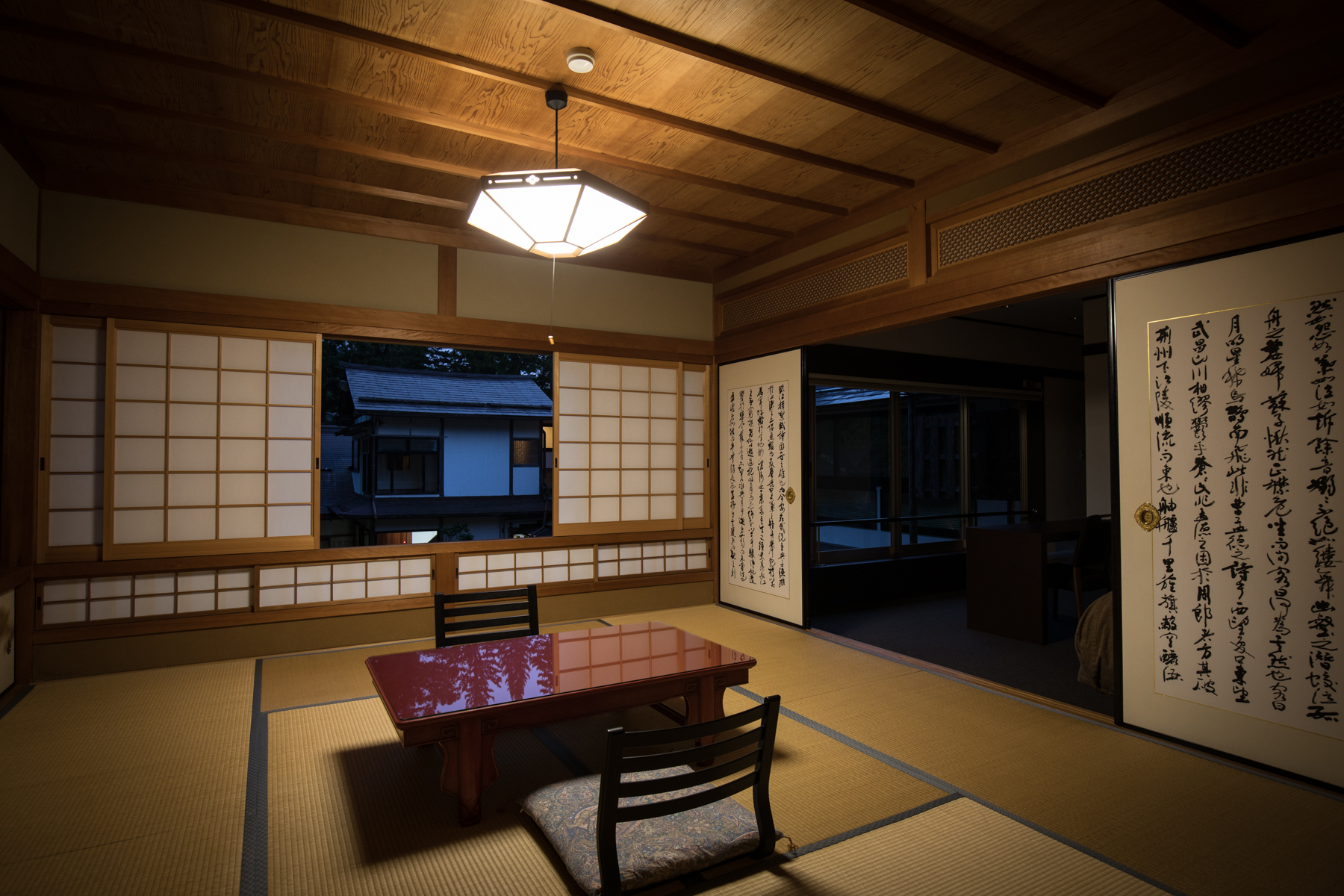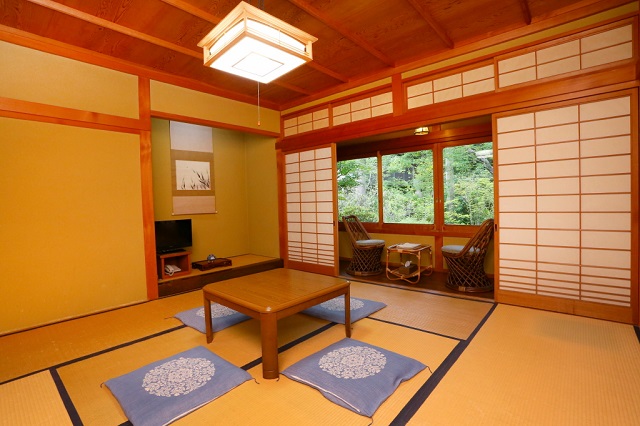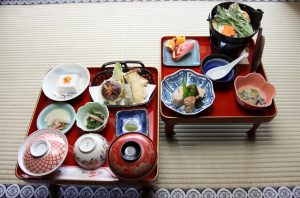
Shukubo(Temple lodging)

Koyasan, with its rich history and culture, had at one time 1,812 temples established within the mountain basin. However, a great fire had wiped out many of the temples that had existed, and some of the smaller temples that remained in the aftermath merged with larger temples. Today, there are now a total of 117 temples that remain, and of the 117 temples, 51 of these temples offer traditional lodging known as shukubo.
∇List of Shukubo Temples
∗If you want to know the detail information of each shukubo, please refer to the URL/link.
- Sainan-in https://sainanin.com/e
- Hoon-in https://www.hoon-in.com/english-home
- Yochi-in https://yochiin.com/shukubo-e.html
- Hoki-in
- Henjoson-in https://eng-shukubo.net/shukubo/henjoson-in/
- Zofuku-in https://www.zofukuin.com/en/home
- Joju-in
- Shakamon-in http://syakamonin.jp/en/index.html
- Joki-in https://jokiin.jp/en/
- Tentoku-in https://tentokuin.or.jp/ (Only available in Japanese)
- Shochi-in
- Hojo-in https://eng-shukubo.net/shukubo/hojo-in/
- Saizen-in https://www.koya.or.jp/en/index.html
- Myoo-in
- Ryuko-in
- Shinno-in https://shinnoin.jp/ (Only available in Japanese)
- Soji-in https://eng-shukubo.net/shukubo/soji-in/
- Renge-in https://eng-shukubo.net/shukubo/renge-in/
- Ichijo-in https://www.itijyoin.or.jp/index.html (Only available in Japanese)
- Annyo-in http://www.annyouin.com/ (Only available in Japanese)
- Rengejo-in https://www.rengejoin.jp/en/
- Nishimuro-in https://koyasan697.jp/ (Only available in Japanese)
- Nan-in https://koyananin.com/ (Only available in Japanese)
- Kodai-in https://eng-shukubo.net/shukubo/kodai-in/
- Ryusen-in https://eng-shukubo.net/shukubo/ryusen-in/
- Fukuchi-in https://www.fukuchiin.com/#
- Hongaku-in https://eng-shukubo.net/shukubo/hongaku-in/
- Muryoko-in https://eng-shukubo.net/shukubo/muryoko-in/
- Honno-in
- Fumon-in https://www.fumonin.net/en/
- Fugen-in https://eng-shukubo.net/shukubo/fugen-in/
- Takamuro-in https://eng-shukubo.net/shukubo/takamuro-in/
- Kongosanmain-in https://www.kongosanmaiin.or.jp/en/home
- Saimon-in https://eng-shukubo.net/shukubo/saimon-in/
- Daien-in https://hpdsp.jp/daienin/en/
- Jofuku-in https://eng-shukubo.net/shukubo/jofuku-in/
- Jimyo-in https://www.jimyoin-koyasan.com/
- Sanbo-in
- Fudo-in https://www.fudouin.or.jp/zen_en_index.html
- Kitamuro-in https://kitamuroin.com/ (Only available in Japanese)
- Henjoko-in https://eng-shukubo.net/shukubo/henjoko-in/
- Jizo-in https://eng-shukubo.net/shukubo/jizo-in/
- Mitsugon-in https://eng-shukubo.net/shukubo/mitsugon-in/
- Jochi-in https://www.koyasan-jyochiin.jp/ (Only available in Japanese)
- Daimyoo-in https://eng-shukubo.net/shukubo/daimyoo-in/
- Komyo-in http://www.komyouin.jp/en/
- Eko-in https://www.ekoin.jp/en/
- Kumagai-ji https://eng-shukubo.net/shukubo/kumagaiji/
- Hozen-in https://eng-shukubo.net/shukubo/hozen-in/
- Sekisho-in https://www.sekishoin.jp/lg_en/
- Shojoshin-in https://shojoshinin.jp/language/engi_en/
Staying at one of these traditional shukubo is sure to provide a truly unique experience. However, some customs observed and practiced at the temples during your visit may come as a surprise. As such, we have provided some videos and additional information below, so you know how to properly observe these customs, and fully enjoy your stay.

Bathing During your Stay
Japan is known for public baths and hot springs, and visitors staying at one of the temples in Koyasan are also able to relax in the public bath on the temple grounds.
Please be aware that customs towards bathing in Japan may differ from customs and attitudes you are familiar with in your own country. As such, please reference the guide below to help ensure you observe the proper customs.
1. Remove your clothes in the changing room (place your clothes/accessories in the basket)
2. Enter the bathing room
3. Wash your body first
4. Pour warm water on yourself to rinse away soap
5. Relax in the bath
6. When you are ready, leave the bath
7. Return to the changing room
8. Wipe your body with a dry towel
9. Put on your clothes
10. Return to your room
*You are required to bathe nude. Please do not wear a bathing suit in the bath.
*The towel is for washing yourself. Please do not let the towel enter the bath.
*Please be aware that spending an extended amount of time in the bath has been known to cause fainting.
*Lightly dry yourself with the towel before leaving the bathing room to avoid water dripping in the changing room.
*After bathing, relax, and be sure you are well hydrated.
*People with tattoos are generally not accepted in the baths. If you have any tattoos, please consult with the owners of the facility prior to entering.
*It is unsafe to enter the bath right after consuming alcohol. As such, please ensure a considerable amount of time has passed after drinking before entering the bath.
Futon (Traditional Japanese bedding)
If you leave your room when staying at a shukubo to go to dinner, don’t be surprised to find your bedding may be laid out for you while you were away.
The traditional bedding that will be provided to you at the temple you are staying is known as a futon. Though you may be familiar with futons in your home country, a traditional Japanese futon differs quite significantly. A typical Japanese futon is made of strong tightly woven cloth and cotton stuffing, and includes a mattress (shikibuton), a quilt (kakebuton), sheets, and a pillow. The Japanese futon also differs from that of futons in other countries in that it is laid out upon the floor-usually over a woven rice mat known as a tatami mat. Once the futon is laid out, sheets are put over the mattress, the quilt is put over both the mattress and the sheets, and an additional sheet is placed over this to make for quite the comfortable night’s sleep.
Meals
Guests staying at one of the shukubos in Koyasan can enjoy unique Buddhist Vegetarian Cuisine known as Shojin Ryori.

Shojin Ryori had originated in China, and is based on the Buddhist precept that one should not cause harm to other living creatures. Though the origin of Shojin Ryori may have come from outside of Japan, the flavor and ingredients have been changed by the monks in Japan over the centuries to align with local ingredients and tastes.
Goma-dofu (Sesame tofu)
This simple dish made of roasted and ground white sesame seeds boiled together with starch powdered arrowroot is one of the most popular ingredients in Shojin Ryori. It is a fragrant and nourishing dish with a silky texture.

Koyasan Shukubo Association
For more information on making a reservation at one of the shukubos, please click the link below to visit the Koyasan Shukubo Association’s official website→Koyasan Shukubo Association
Hotel & Guest House
Guest House Kokuu offers accommodations for visitors who would like to stay overnight in Koyasan, but prefer a stay at lodging other than those offered by the temples. Guest House Kokuu offers several different lodging styles ranging from a capsule style room to a single room or even double sized room. Their facilities also offer free Wi-Fi, Western style bedding, and laundry services. For more information please visit their website here→Guest House Kokuu
